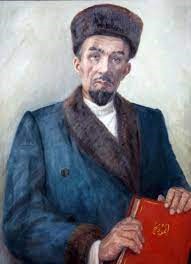
Qayum Nasyri was an educator, linguist, writer, historian and ethnographer.
He was born in February 2, 1825 in Verkhniye Shirdany village, Sviyazhsk district, Kazan province (now Malyye Shirdany village, Zelenodolsk district of the Republic of Tatarstan). His father’s maktab served as the setting for his early education. From 1841 to 1855, he attended Madrasah Qasimiya in Kazan. He taught himself Russian. Nasyri was a Tatar language teacher at the Kazan Theological School from 1855 to 1871 and later at the Kazan Theological Seminary. He established an elementary Russian-Tatar school for Tatars in Kazan in 1871 at the suggestion of V.V. Radlov, the superintendent for the Tatar, Bashkir, and Kazakh schools of the Kazan School District. In 1876, he left school and engaged in literary and scientific pursuits because of a disagreement with V.V. Radlov regarding the methods of education.
According to Nasyri, acquainting oneself with and fostering a relationship with Russian culture was crucial for the enlightenment of the Tatar people. He was elected a full member of the Kazan University Society of Archeology, History, and Ethnography in 1885. Nasyri laid the groundwork for the modern Tatar literary language and made a significant contribution to the growth of various humanities fields.
Qayum Nasyri is the author of works on Tatar lexicography (the Russian-Tatar dictionary of 1892, the first explanatory dictionary of the Tatar language in two volumes of 1895-1896), phonetics and grammar, literature, science, ethics, linguistic issues, and folklore (Fruits for interlocutors in Literature, 1884). The History of the Tatars, Russia, and the rest of the world are all major topics in Nasyri’s scientific research. His ethnographic research includes numerous folk signs, fairy tales, proverbs, songs, descriptions of wedding, funeral, and other family rituals, as well as items from the Tatar people’s material culture, including housing, clothing, food, and details on traditional medicine. Nasyri’s legacy had a profound effect on G. Tukay, M. Gafuri, G. Kamal, etc. He died in August 20, 1902 in Kazan, and was buried in the cemetery of the New Tatar Settlement.
